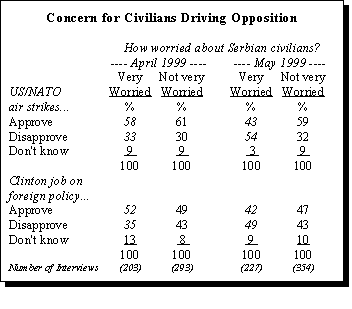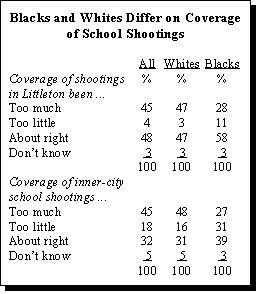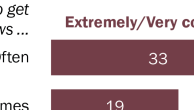Introduction and Summary
Public support for the war in the Balkans is fading. Approval of U.S. participation in the NATO effort has fallen to 53% from 62% in mid-April, and fewer Americans are paying very close attention to the air war now than just three weeks ago. At the same time, the public is increasingly divided over President Clinton’s stewardship of foreign policy: 46% approve; 43% disapprove. This is the first time since June 1995 that Clinton has failed to get majority support for his handling of foreign policy.

Unintended casualties, such as the accidental bombing of the Chinese embassy, are dragging down public support for the war. Disapproval of the air war increased by 21 percentage points since mid-April among Americans highly concerned about civilians being hurt or killed by the NATO attacks. Support for the war remained constant over this period among people less worried about civilians.
Even as Clinton’s foreign affairs ratings slipped, his overall job approval shows no change since last month, holding at 56% in the new nationwide Pew Research Center poll conducted May 12-16, 1999.
Waning public support for the military effort in Yugoslavia, however, is also reflected in public opposition to sending ground troops into the region. Some 49% of Americans say they would oppose sending troops to Kosovo, if the air strikes do not stop the fighting there; 44% would support sending troops. Notably, opposition is just as strong even when the question mentions using troops to “end the conflict in Kosovo” — wording that tended in previous surveys to draw slightly more support for sending forces. Even with this phrase in the question, 50% oppose sending troops, up from 42% in April.
Worries Change
At the same time, public worries about the fate of U.S. troops in Kosovo have declined in recent weeks. Some 56% of Americans say they are very worried that U.S. troops might suffer casualties, down from 66% in April. Even fewer (49%) are very worried that U.S. troops could be involved in Kosovo for a long time, down from 63%.
The public now worries as much about civilian victims in Yugoslavia as about U.S. troops. Some 50% of Americans say they are very worried that innocent people are being hurt or killed by the air strikes. And 37% are very worried about Serbian civilians, a figure that is unchanged from April (40%).
The drop in support for the air strikes has been sharpest among those most concerned about these civilian casualties. In April, people who were very worried about Serbian civilians supported the air strikes, 58%-33%. Today, those very worried about Serbian civilians oppose the air strikes, 43%-54%. People who express less concern about civilians continue to support the strikes. The drop in approval of the way Clinton is handling foreign affairs is also especially large among those most concerned about civilian victims in Yugoslavia.

Two-thirds of Americans (69%) say preventing the killing of citizens in Kosovo is a very important reason for using U.S. troops, if they are sent to the region. Smaller majorities also rate ending starvation and a refugee problem (57%) and preventing a larger war in the region (52%) as very important reasons for using troops.
News Interest Index
While majorities of Americans continue to endorse the use of American military force for humanitarian purposes, interest in news of the NATO air campaign against Serbia fell precipitously over the past month. Just one-third of Americans are paying very close attention to news of the air strikes — 32% today compared to 41% in mid-April and 43% in late March. Interest in the air strikes ranks well behind the Littleton High School shooting (59%) and slightly behind the tornadoes in Oklahoma and Kansas (38%).
Last month, interest was held high in part by the capture of three U.S. soldiers, a story that garnered the very close attention of 47% of Americans. The accidental bombing of the Chinese embassy this month got similar attention from just 24% of the public.
Focus on School Violence
Interest in the high school shooting in Littleton, Colorado remains high. Six-in-ten Americans continue to pay very close attention to the news, three weeks after the tragedy. Although this reflects a decline from the 68% who were closely attuned to the shooting in its immediate aftermath, the follow-up reports continue to rank among the top news stories of the decade, equal to the 1995 bombing of a federal building in Oklahoma City and the bomb blast at the 1996 Summer Olympics in Atlanta.
Young people, who typically pay less attention than their elders to the news, are sticking with this story. Some 57% of those under age 30 are following the story very closely, compared to 54% of those between ages 30 and 49, and 67% of people 50 and older. Women continue to follow the news more closely than men (65% vs. 52% paying very close attention) and blacks are more engaged than whites (65% vs. 59%).

Despite strong interest in the story, Americans are divided over whether the coverage of Littleton has been excessive: 48% say it has been about right, 45% say too much. The same number of Americans say that there has been too much coverage of inner-city school shootings, but on this question a far larger share say there has been too little (18% vs. 4%).
On both questions, significant differences are seen between blacks and whites. In both inner-city school shootings and the Littleton incident, African Americans are more sympathetic to heavy news coverage than whites. Blacks are nearly twice as likely as whites to say that the shootings in inner-city schools are undercovered by the news media, and they are much less likely to say the shootings at Littleton are being overcovered.




